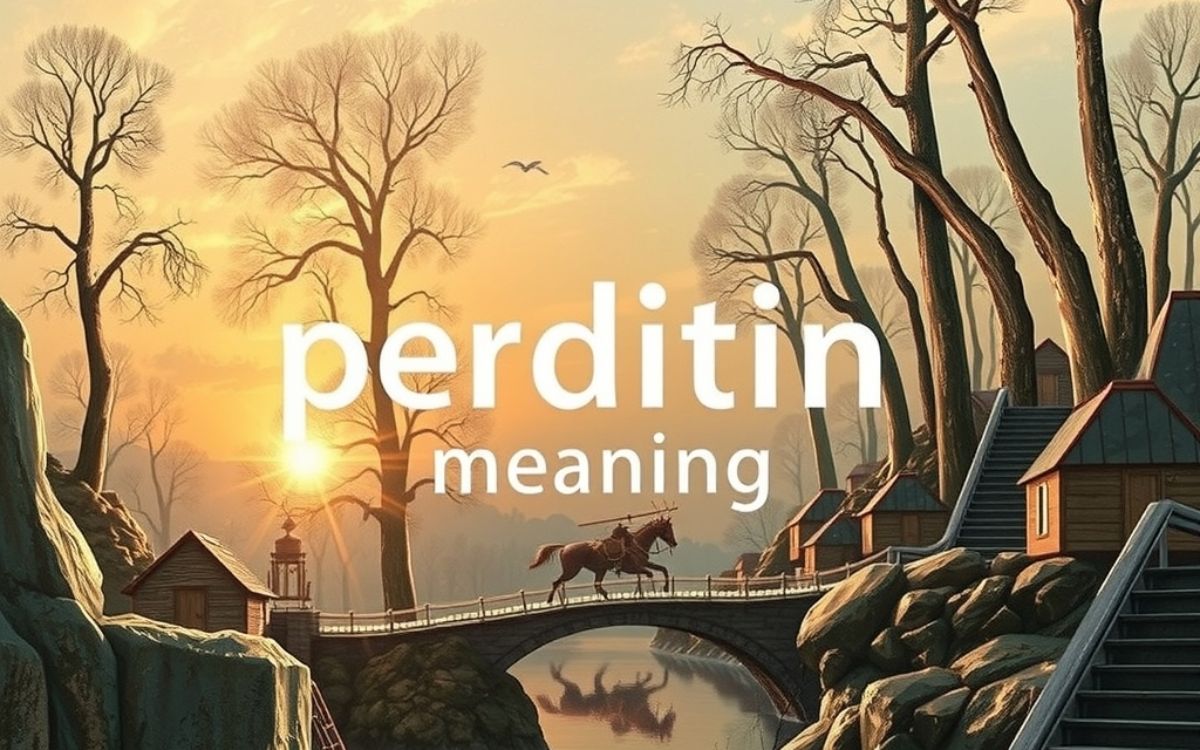The word perdition isn’t something you hear in daily conversation, yet when it appears, it carries a heavy and almost haunting tone. It’s one of those words that feels old, mysterious, and tied to big ideas like fate, destruction, or the afterlife. Because of that, people often pause and wonder, “What exactly does perdition mean?”
At its core, perdition refers to a state of ruin, often connected with eternal damnation in a religious context. The Bible, literature, and even modern films have used the term to describe ultimate loss—whether that’s the downfall of a soul or the collapse of a life path. Its power comes from the way it blends history, faith, and human choices into a single word.
In this guide, you’ll discover the meaning of perdition, where it comes from, how it’s used in the Bible, and why it still shows up in everyday discussions. We’ll also explore examples from law, culture, and popular media so that by the end, the word will feel much less mysterious—and a lot more meaningful.
What Does Perdition Mean?
Perdition comes from the Latin word perditio, meaning destruction or ruin. In English, it usually refers to a state of eternal damnation, often linked with hell.
In everyday speech, you might hear someone say, “That decision led him to his own perdition,” meaning it brought about his downfall. It’s not a word you’ll hear daily, but when used, it has weight and seriousness.
What Does Perdition Mean in the Bible?
In the Bible, perdition is strongly tied to the idea of spiritual destruction and eternal separation from God. It appears in translations like the King James Bible, usually pointing to punishment after death.
For believers, the word carries a warning: choosing sin leads to perdition, while faith leads to salvation.
What Is the Road to Perdition?
The phrase “road to perdition” describes a path of destruction. It became famous from the 2002 movie Road to Perdition starring Tom Hanks, which told the story of a father and son caught in cycles of crime and revenge.
Outside of film, the phrase simply means a course of action that ends in ruin.
Is Perdition the Same as Purgatory?
No, perdition and purgatory are very different. Perdition means final damnation—no return, no escape. Purgatory, according to Catholic belief, is a temporary place where souls are purified before entering heaven.
Think of perdition as a locked door, and purgatory as a waiting room with hope.
What Is the Legal Definition of Perdition?
In older legal texts, perdition meant total loss—like “perdition of life” (execution) or “perdition of estate” (forfeiture of property). While rarely used in modern law, it reflected the seriousness of punishment.
Today, legal systems prefer clearer terms like penalty, forfeiture, or sentence.
What Did Jesus Mean by “Son of Perdition”?
In John 17:12, Jesus called Judas Iscariot the “son of perdition.” This meant Judas was destined for ruin because of his betrayal. The phrase highlights not just Judas’s actions but his final spiritual state.
Why Did Jesus Say It Would Be Better if Judas Was Never Born?
In Matthew 26:24, Jesus said, “It would have been better for that man if he had not been born.” This statement reflects the gravity of Judas’s betrayal. The idea is that Judas’s choice led him to eternal perdition, making his life tragically wasted.
Who Is the Man of Perdition in the Bible?
In 2 Thessalonians 2:3, Paul refers to a “man of perdition” (or “man of lawlessness”). Many scholars link this figure to the Antichrist, a symbol of ultimate rebellion against God. The phrase points to someone destined for destruction.
What Is the Opposite of Perdition?
The opposite of perdition is salvation or redemption. If perdition means ruin and eternal loss, salvation means rescue and eternal life.
In everyday speech, you could say: “Kindness is the salvation of a cold world,” just as perdition could describe its downfall.
What Is the Flame of Perdition?
The flame of perdition often symbolizes eternal fire and punishment. It appears in literature, sermons, and even fantasy writing to describe never-ending torment.
Writers use the phrase to stir emotion, painting a vivid picture of suffering or doom.
Examples of Perdition in Literature & Media
- Shakespeare used the word to capture tragic ruin.
- In modern culture, the term appears in novels and heavy metal music, often tied to dark or apocalyptic themes.
- Films like Road to Perdition keep the word alive, showing its power to convey deep moral consequences.
Conclusion
Perdition is more than just an old or dramatic word—it represents ultimate loss, ruin, and spiritual downfall. Whether in the Bible, literature, or everyday speech, it captures the consequences of choices and the seriousness of moral paths. Understanding its meaning gives you insight into how language can carry weight and emotion across centuries.
By exploring its origins, biblical references, legal uses, and cultural examples, you can see why perdition still resonates today. Recognizing the difference between ruin and redemption helps you appreciate the word’s depth and encourages reflection on the paths we choose in life.
FAQs
What does perdition mean in the Bible?
In the Bible, perdition refers to eternal damnation, spiritual ruin, or complete separation from God, often used to warn against sin and disobedience.
What is meant by the Road to Perdition?
The Road to Perdition symbolizes a path leading to destruction, ruin, or moral downfall, often reflecting choices with severe or irreversible consequences.
Is perdition the same as purgatory?
No, perdition means eternal damnation, while purgatory is temporary purification before heaven; one is final loss, the other offers redemption and hope.
What is the legal definition of perdition?
Legally, perdition historically meant total loss, such as forfeiture of life, property, or rights; today it’s rarely used in modern law.
What did Jesus mean by son of perdition?
Jesus called Judas the son of perdition, meaning he was destined for ruin due to betrayal, highlighting ultimate spiritual loss and damnation.
Why did Jesus say it would be better if Judas was never born?
Jesus said this because Judas’s betrayal led to eternal ruin, emphasizing the gravity of sin and the irreversible path toward perdition.
Who is the man of perdition in the Bible?
The man of perdition (2 Thessalonians 2:3) refers to the Antichrist or lawless figure destined for destruction and opposition to God.
What is the opposite of perdition?
The opposite of perdition is salvation, redemption, or deliverance—representing rescue from ruin and the promise of eternal life or spiritual safety.
What is the flame of perdition?
The flame of perdition symbolizes eternal fire, punishment, or torment, often used in religious texts and literature to depict everlasting destruction.

Welcome to Bloomnis.com! I am the admin, here to bring you the best jokes and laughter. My goal is to make your day brighter with funny content. Enjoy jokes, puns, and humor anytime. Keep smiling and have fun with us. Laughter is the best medicine!
















